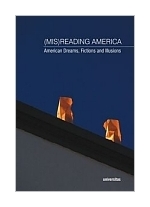|
||
• wydawnictwa polskie
• Zamów informacje o nowościach z wybranego tematu • kontakt
• Cookies na stronie |
(MIS)READING AMERICA AMERICAN DREAMS FICTIONS AND ILLUSIONSDURCZAK J. FRELIK P.wydawnictwo: UNIVERSITAS , rok wydania 2011, wydanie Icena netto: Since the initial arrival of Spanish, French and English explorers, North America has stirred controversies, discussions and conflicting interpretations. A source of fascination for explorers, settlers and those in the Old World, the continent has, not surprisingly, generated many myths, fictions and stereotypes. The United States of America, the first independent country established on the continent, in particular and virtually from its inception engendered various interpretations and misinterpretations, readings and misreadings, as expressed in scientific, scholarly and artistic endeavors. The United States meant different things to residents, who had to deal with the country’s sometimes painful realities, and to prospective immigrants, for whom America was primarily a noble idea or a dream. Even today, extreme variations in perspective predominate: America and Americans are portrayed from radically different and often mutually exclusive viewpoints. The present volume offers essays which detail the various ways in which the United States, its people, its history and its culture have been depicted, understood and misunderstood throughout centuries. The authors explore this vast subject with reference to literature, film, music, painting and politics. They write about the past, the present and the potential future using different methodologies which reflect the polyvocal nature of their subject. The image of America and its people that emerges is far from smooth and consistent, but that is entirely in keeping with the inexhaustible complexity and the infinite variety of the nation under consideration in this volume.
Już w czasach pierwszych podróży żeglarzy hiszpańskich, francuskich czy angielskich w stronę Nowego Świata, Ameryka Północna była przedmiotem wielu mitów, legend i wzajemnie wykluczających się interpretacji. Kontynent zadziwiał i fascynował zarówno odkrywców i podróżników, jak i emigrantów, którzy uznali, że po drugiej stronie Atlantyku ich życie będzie lepsze i pełniejsze. Także pierwsze niepodległe państwo na kontynencie, Stany Zjednoczone Ameryki, okazały się szczególnie interesujące dla historyków, polityków, filozofów czy artystów. Ich prace na temat nowego państwa i uosabianych przez nie wartości przyczyniły się do powstania licznych mitów i stereotypów, które później weryfikowane były przez rzesze emigrantów. Mieszkańcy Stanów Zjednoczonych, podobnie jak opisujący je uczeni, publicyści, pisarze i artyści, również nie byli jednomyślni w ocenie swojego kraju; dla jednych Ameryka była krajem postępu i nieograniczonych możliwości, dla innych synonimem kapitalistycznego wyzysku i molochem hamującym rozwój jednostki. Także dzisiaj spory na temat Stanów Zjednoczonych nie cichną, a opinie na temat charakteru, roli i znaczenia tego państwa pozostają skrajnie różne. Autorzy esejów zamieszczonych w (Mis)Reading America. American Dreams, Fictions and Illusions analizują te spory wokół Ameryki i Stanów Zjednoczonych, przyglądają się stereotypom i – używając przykładów z literatury, filmu, muzyki, malarstwa czy polityki – starają się przybliżyć czytelnikowi ich naturę i charakter.
Contents Introduction: From John Smith’s Map to Southland Tales –
Four Centuries of Reading America. 482 pages, Paperback Księgarnia nie działa. Nie odpowiadamy na pytania i nie realizujemy zamówien. Do odwolania !. |


